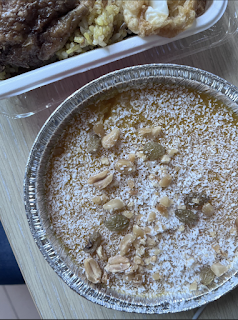A Trip to the Taipei Grand Mosque
Yanglong Tan, a second-year student doing the combined Master of Arts in International Relations and HNC Certificate sought to organize an enriching trip for his SAIS classmates currently based in Taipei, Taiwan. He reached out to the Singapore Trade Office in Taipei and the Taipei Grand Mosque to arrange engagement sessions that he thought would be meaningful for his classmates.
“It’s the oldest mosque in Taiwan with a lot of history and significance,” Tan said. “I have always taken an interest in how Islam is practiced and understood in different regions.”
Other students, like Daniel Mikesell, shared similar motivations to join the trip, seeing it as a great opportunity to utilize Chinese to discuss contemporary issues in Islam. “I was inclined to attend because I was curious to learn about Islam in the context of Taiwan,” Mikesell said.
 |
| SAIS Students with the caretaker of the Taipei Grand Mosque |
The trip entailed a short tour of the mosque and explanations of the key tenets of Islam led by the caretaker of the Mosque. Students toured the main prayer hall containing the interior of the dome, clocks showcasing the different prayer timings, and a room where faith adherents washed themselves before prayer. The caretaker introduced the religion to the students, explaining cleaning rituals, the direction of prayer, and the five pillars of Islam. The conversations also extended to Islam and international relations among countries like Iran, Afghanistan, the US, and China.
We also asked students how this trip tied into their coursework. One student found the trip directly related to her Anthropology and China Studies” (人类学与中国研究) class this semester.
“The caretaker of the Mosque was a Thai man who had lived in Taiwan for a long time and was fluent in Mandarin, Arabic, and English,” she said. “Hearing his personal views on Islam, how it is perceived in China, the US and Taiwan, was an unforgettable experience.”
Overall, the students were able to take away many key lessons from the trip. Tan shared another example of how Islam has absorbed cultural elements in Taiwan with the room called 美体房 (meitingfang or literally translated to “beauty room”). “It is actually a room where the bodies of Muslims who have passed away are sent to for cleaning,” Tan clarified. “But where is syncretism? It comes from the fact that the word for “the dead” in Arabic is “الميّت” (pronounced al-mayyit) and 美体 is a direct and clever translation of it.”
 |
| Mahalibya served near the Grand Mosque |
Most importantly, Tan learned that every Friday around noon, a small bazaar outside the Mosque sells food from Middle Eastern countries. He went last week, and indeed managed to get a delicious Egyptian mahalibya (مهلبية) for just 80 TWD (about 2.5 USD).
Yanglong Tan is a second year MAIR + HNC Certificate Student. He majored in Sociology during his undergraduate studies, focusing on Medical, Political and Economic Sociology and Anthropology. Tan is from Singapore and is currently studying in Taipei, Taiwan.
Written by Betty Thai, Certificate/ MAIR '23


